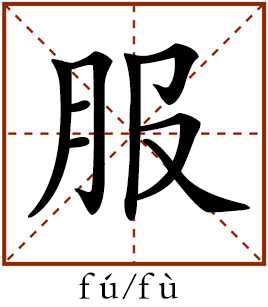Clothing

This character has two tones. When pronounced as fú, it refers to clothes as a noun or taking medicine as a verb. It refers to a Chinese unit of traditional Chinese medicine when pronounced as fù.
胡服骑射
hú fú qí shè
Hu refers to ancient nomads in northern China and fu is clothes. Qi refers to riding a horse while she refers to shooting arrows. This idiom literally means the wearing of the Hu-styled attire and shooting from horseback.
This idiom is derived from a reform conducted by King Wuling of Zhao (c. 340–295 BCE), who reigned in the state of Zhao during the Warring States Period. During the early years of his reign, Zhao was constantly harassed by nomadic tribes. The powerful fighting capability of nomadic soldiers on horseback attracted King Wuling’s attention, inspiring his reform in 307 BCE. Before the reform, Zhao commanders riding on horseback still wore long robes and court garments with wide, loose sleeves, which were difficult to move around in during battles. King Wuling ordered all commanders to adopt the Hu-styled clothing that featured short coats with narrow sleeves, which were more suitable for fighting on horseback. He also established a cavalry division in the army and trained them in the ways of cavalry charges as well as in horse archery. King Wuling himself also wore Hu dress in court and encouraged others to follow suit.
The reform of “wearing the Hu-styled attire and shooting from horseback” was more of a military improvement. It played an important role in soothing the conflict between the two major powers within the state, the Han civilization and the nomadic civilization. Zhao was characterized by the deep fusion of culture between the Han Chinese and nomads through large-scale mixed marriages and forms of communication. Conflicts between these two civilizations had severely affected the social and political development of the state. Therefore, King Wuling wanted to reduce domestic divisions and conflicts through the reform.
As a result, King Wuling’s reforms greatly improved the fighting capability of the Zhao military. The Zhao army launched several successful expeditions into the territories of the Hu people in the north.
edited by REN GUANHONG
